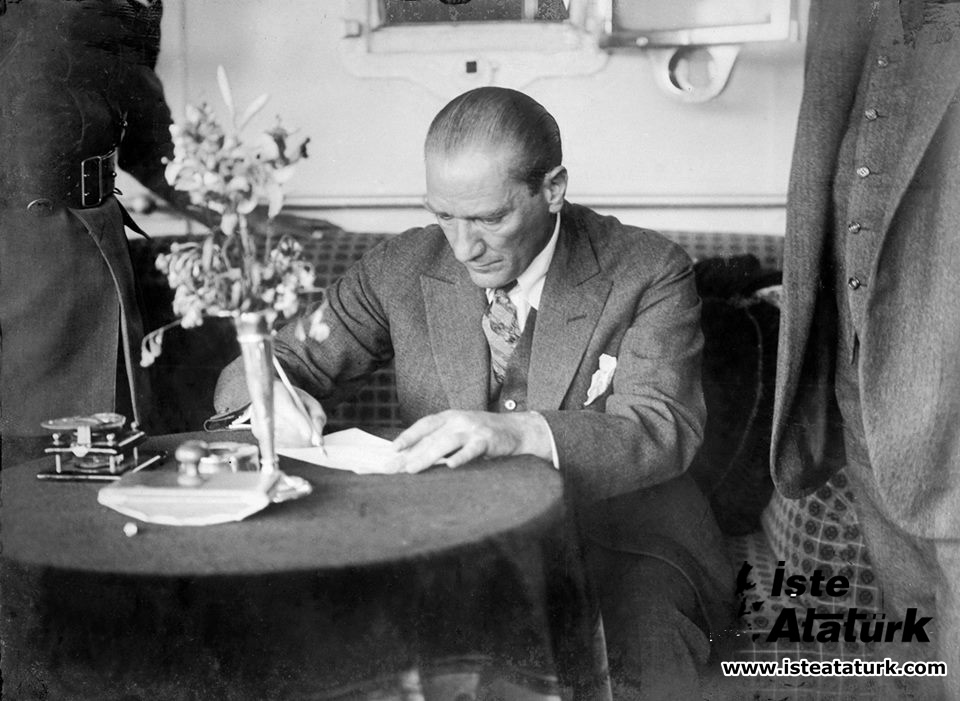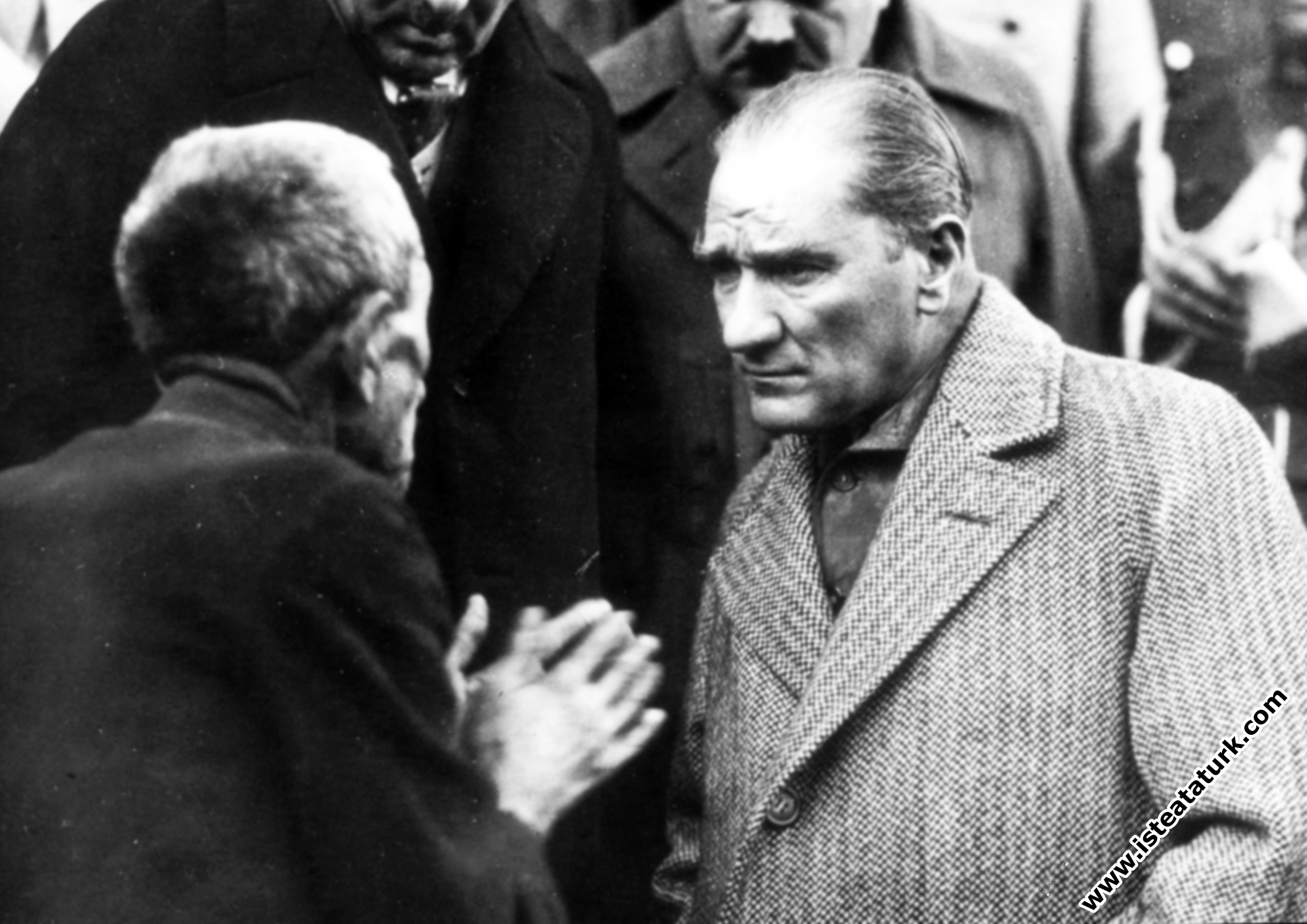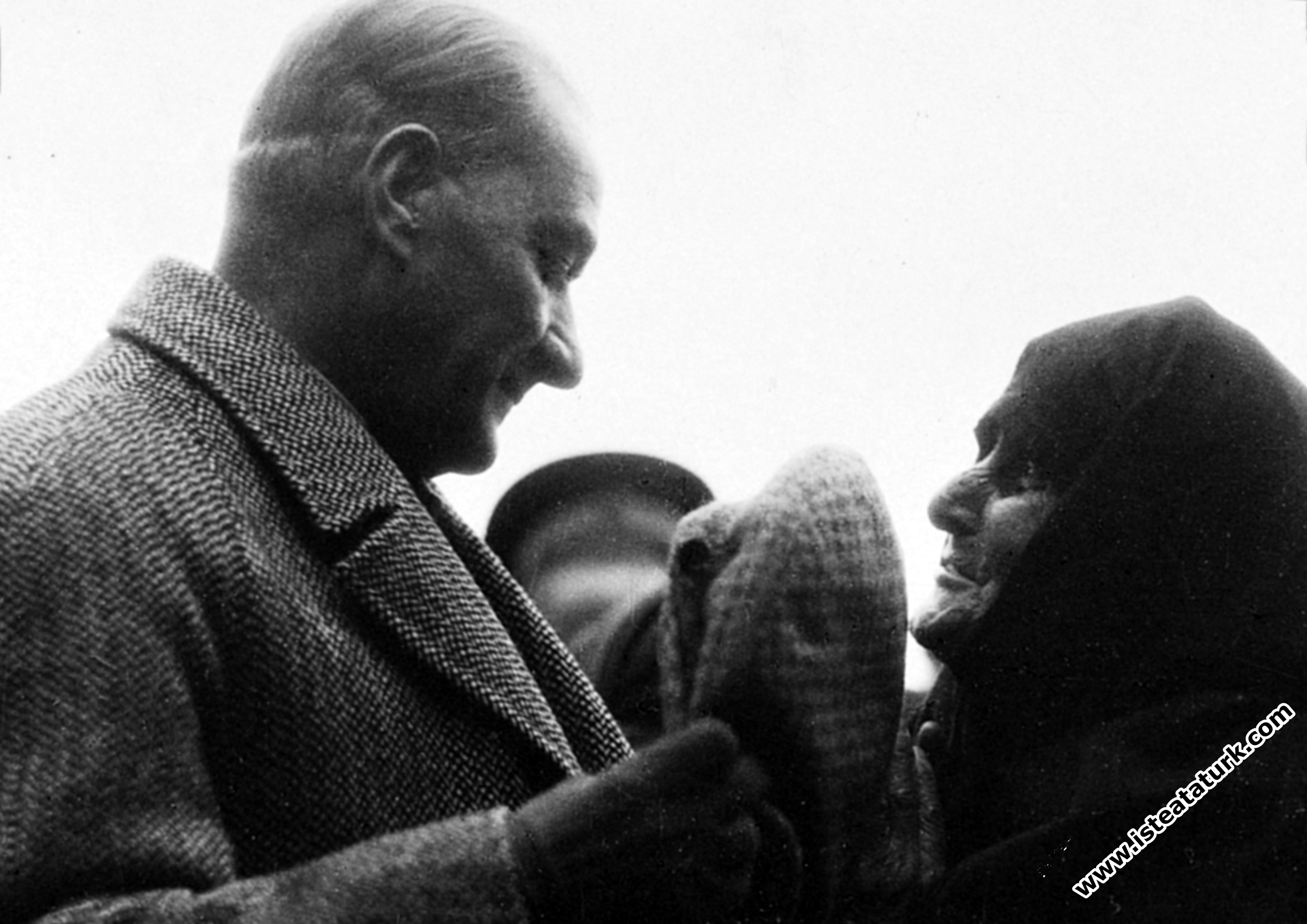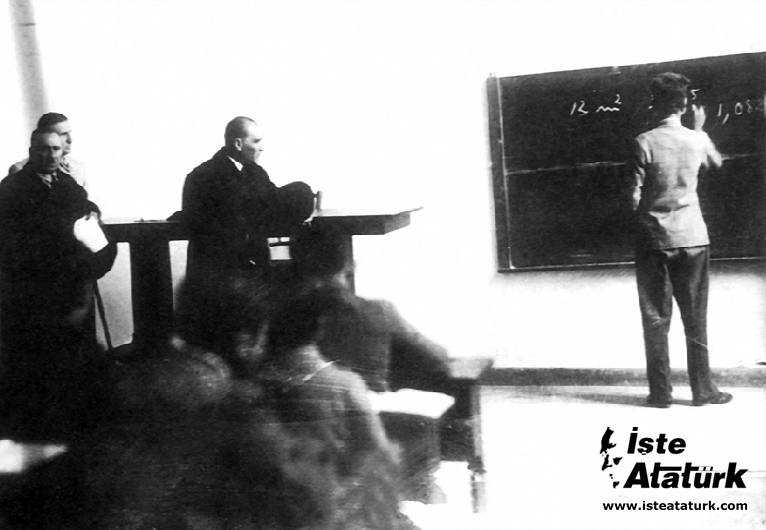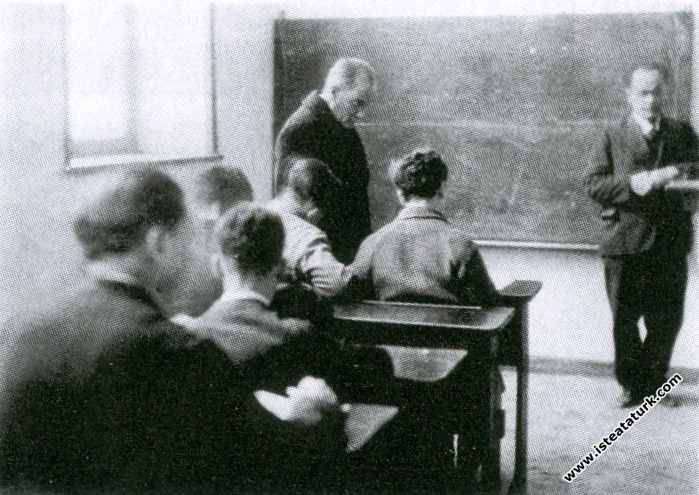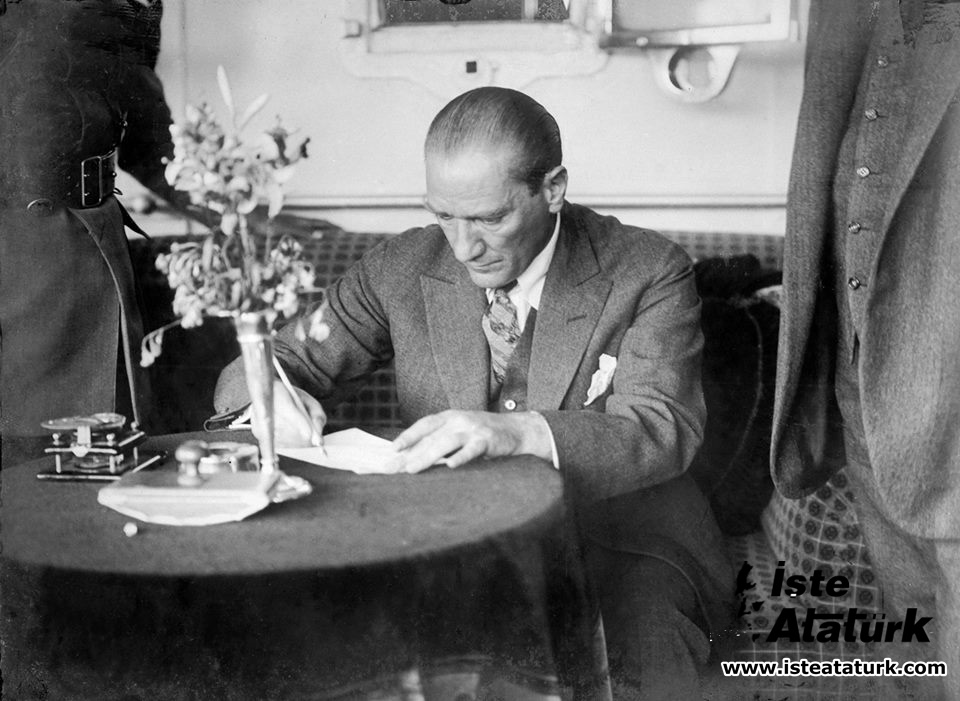
Atatürk's Sensitivity to Statesmanship
Character Size
They ask Him; What is the secret of your strength? “I'll stop and listen,” she says. Then it repeats; “I listen” and shut up.
ATATÜRK'S STATESMAN SENSITIVITY
It is a fairly common occurrence that nations with a long history have produced highly skilled politicians and statesmen or highly qualified soldiers throughout their history. In this respect, the Turkish Nation sets an outstanding example. However, in the lives of societies that cover very different areas, it is rare to see the existence of a multi-faceted leader who has gathered the qualities and abilities of military and statesman, and especially the success of realizing radical reforms, as a whole, in his own person. Atatürk is one of these exceptional people in world history. Especially, in our national history, the "Single" person is.
Atatürk is the political leader as well as the military leader of the Turkish War of Independence, and is the “Founder of the Contemporary Turkish State” not only in our eyes but also in the world public opinion.
Since his young age, he has found himself in a depressed environment in terms of the political, social, economic and cultural conditions of social life, as well as in terms of military service; His military life, which extended to almost every corner of the empire, brought him face to face with the internal and external problems of a collapsing state. His alert and inquisitive mind led him to find solutions to the country's problems. In fact, for a while, he found himself in active politics; However, he managed to get away in a short time. However, during his high command, he did not fail to explain his thoughts and suggestions that warned the Ottoman Government and the public, due to the intertwined nature of politics and strategy.
Especially the National War of Independence and its aftermath is the period when his statesmanship qualities emerged with all their brilliance. The most obvious among these qualities that give way to each other,
“It is knowing people well and knowing who to appoint where and how”.
After the victory of our National Struggle, who would represent Turkey in the peace talks became a problem. According to the expectations of the public, the strongest candidate is Rauf Orbay. Rauf Orbay is also enthusiastic about this. However, Atatürk sent İsmet İnönü to Lausanne, not Rauf Orbay, as the “Chief Executive Officer”. A dream of silence for everyone!
Ataturk says; “You do not know İsmet Pasha. Because his life was spent at the front. He stayed in Ankara for a short time. You didn't have the time and opportunity to get to know each other. This man is smart, he is wise. He is particularly sensitive to opinion and examination. For example, if I commission one of you to topple that table, two or three can finally topple it in four ways. İsmet Pasha has the power to overthrow it in eight or ten ways.1 Another Example:
Shortly after the establishment of the Turkish Grand National Assembly, the rebels killed the District Governor with an ax in Nallıhan. They are about to march on Ankara. An air of uneasiness begins to blow in the assembly. Members of the assembly immediately applied to Mustafa Kemal. He said without hesitation, “Let's send Mr. Refet, we have no other choice. Only he can handle this," he said. Refet Bey was sent off with excitement and hope. He left... He suppressed the rebellion with astonishing speed.2
At the beginning of the qualifications of the statesman comes the love of the country and the nation. A man without love is doomed to wither, society without love is doomed to wither. The reasons for the collapse of states and societies in history are only because of the loss of love. Ancient Rome and Abbasids... The Ottoman Empire after Kanuni and more, what! The best example of love is the endless love Atatürk felt for his nation from his birth to his death.
A dinner is eaten after the victory. Everyone has the happiness of victory and a sweet smile on their face. Once, Ruşen Eşref asks permission to read a poem written by a young man from Izmir. Poetry, (here's place in history) Armies! Your destination is the Mediterranean, Forward! ends with his words. Everyone likes poetry. There are those who say, "Let's find the author", "Let's encourage it". All eyes are on Mustafa Kemal Pasha. What will he say? Ata explains his thought in a low voice; This poem praises my worthless existence from start to finish, but I have done nothing to be proud of. Victory belongs to the nation. It belongs to all of us... I am only your image. It is a nation to be praised. Hundreds of thousands of Mehmets running from Sakarya to İzmir without sandals. Tell this young friend of ours that from now on, praise the great Turkish Nation, not Mustafa Kemal Paya... Because it is the nation that does all this.
One of the main qualities of a statesman is to be reckless. Being reckless is the only means by which the statesman can realize what he believes in. After every precaution is taken and everything is cooked in the plan of prudence, there is a need for boldness and boldness. Atatürk often activates this quality throughout his life.
On the fifth day of his arrival in Erzurum, he is called to the machine. The caller is directly the sultan. He is ordered to return to Istanbul, it is promised that he can go wherever he wants with a long disguise... The Pasha refuses, the sultan insists... The conversation continues with increasing harshness.. Mustafa Kemal, who burned all the bridges he left behind; After saying “I absolutely refuse, I will not return to Istanbul...”, the sultan also said; "Then, your official duty has come to an end..." The Pasha gives an example of an iron will and an endless courage at that moment... "They dismiss me, but I have been sacked from my job as a civil servant and from my profession, which I love as much as my life, from the military. I'm withdrawing too…” He immediately announces his resignation to the palace and the Ministry of War. After the telegrams were sent, he returned to his companions without the slightest hesitation or even regret;
A statesman must be ambitious... Ambition is a powerful factor that brings dynamism to a statesman... Atatürk is also a man of passion. What is this passion? A Mussolini is not a miserable passion that throws their nation into the abyss like Hitler's, but a sacred passion that leads the Turkish Nation to victory, success, prosperity and happiness... It is a passion not to leave the oldest and most civilized nation in history without a state. What could be higher and more glorious than this that exists on the universe?
The statesman is sincere in his case. Sincerity; deep, great, pure sincerity is the main characteristic of great men... By sincerity we do not mean sincerity, sincerity is not self-evident... Such sincerity consists of empty boasting... When we look at Atatürk's personality, we see an exemplary sincerity. Sakarya moves to the front before the Pitched Battle. It leads to Montenegro, which dominates the environment. His aim is to see the direction of attack the enemy is likely to follow... He lights a cigarette and mounts his horse. When the animal kicks back, frightened by the flame of his match, Mustafa Kemal falls violently to the ground... One of his ribs is broken; for a moment, it compresses his lungs, preventing him from breathing and speaking. The doctor next to him warns himself severely: “Your life is in danger if you continue”. Mustafa Kemal said, “Let the war be over, then I will be healed. This, It is a sign of God. Just as my bone was broken, the resistance of the enemy will be broken in the same place," and he rejects the offer of someone else to command the army. And then he commands the Turkish army in the Battle of Sakarya.4
The statesman knows how to listen as well as how to speak very well... Atatürk is a person who talks constantly while trying to convince those around him. However, he knows how to listen as much as he speaks. They ask Him; What is the secret of your strength? "I'll stop and listen," he says. Then it repeats; “I listen” and shut up.
Making the best use of time, always being determined, doing everything in place and on time, not compromising on the cause he believes in are the most characteristic features of Atatürk.
The alphabet reform studies started and a commission was established. Everyone, including Prime Minister İsmet Pasha, is of the opinion that a seven-year transitional period is needed for this to happen. The great revolutionary sets the time. 3 months.5 Before the expiry of the period, the new Turkish Alphabet begins to be used all over the country.
Farsightedness is one of the golden qualities of statesmen who shape history. While Atatürk was watching the world around him with his unique deep perspective, he saw clearly what would happen in the future. American General Mac, who met with him in 1932. In long conversations with Arthur, he foretold the future like a prophet. During this meeting in 1932, we see that Atatürk made the following assessment. “Germany is capable of forming a large army in a short time and occupying all of Europe, with the exception of Russia. France has lost its ability to build up a large military force. England no longer takes France into account for the defense of the islands... The present chief of Italy, will not be able to resist the temptation to play the role of a Caesar, and will quickly reveal the fact that Italy is far from a military power... America will not remain neutral and Germany will be defeated as a result of America's participation in the war. If European statesmen do not cast aside their selfish and divisive feelings in the national sphere; if they do not sincerely and resolutely try to resolve the fundamental political question for the benefit of the whole of Europe; I fear that it will be impossible to avoid a new catastrophe.... Today, a new power has emerged in the East, threatening civilization, even all of humanity. This power, apart from mobilizing all its material and spiritual resources for a world revolution; It also employs methods not yet known by Europeans and Americans. England and not France or Germany; but it will be Bolshevik Russia.” And so it has been.6
He was also far from the adventurism disease, which has haunted many statesmen in history, and which embodied in our country, Enver Pasha. For this reason, he did not stray until the end of the case of not putting the life of a single Turk in danger, without calculation and unnecessary. One day, you went all the way to Edirne, Thessaloniki was beyond a bullet, couldn't you take the place where you were born? they asked. Ataturk; How would I not want to take the beautiful Thessaloniki, the streets of which I circled, played in love and lay my dead. We looked like a poplar tree in the days when we fought the War of Independence. You know, poplar roots are on the surface, close to the ground. What if the return to the great duvel had tried to deal with us, maybe Anatolia would be in danger. At that time, I used my mind, not my senses, he said.7
At the end of his life, he was sleepless and angry because of the Hatay issue. One day, a friend, my pasha, why do you keep upsetting yourself and your nation. If you send a Division, you will get Hatay. “Will the French fight you for a flag of Syria?” he said. His anger and anger subsided like a wave, and his voice slowed. Yes, I know that too. If I send a division, we can take Hatay. But if this situation touches the dignity of the French and they will resist! Returning to the questioner, I cannot endanger sixty or so Turkish provinces for one sanjak. Because of this, M. Kemal Atatürk died by adding new lands to his homeland that he saved. However, Hitler had to kill himself in order not to be a prisoner of the enemy in a ruin of his homeland, which became heaps of ashes.
He faithfully implemented that statesmen should be careful in their words and behaviors and that they should guard the honor and dignity of the state. He respectfully protected these values, not only of his own country, but also of the other countries.
The great peace fighter Atatürk was extremely touched by the sight he saw on the morning of his victory in the Commander-in-Chief, while touring the battlefield with his aide, Muzaffer Kılıç. Adjutant said, “The sight you see is something that will make humanity blush. But we did not do this, they forced us, he said, pointing to a Greek flag he saw on the ground after a while, and gave the order, "Remove this immediately, the sign of a nation's independence cannot creep on the ground."
H. Suphi, who knew him very well, was in the National Assembly he presided, in the government he presided, in his table and in his travels, which he saw as a huge spiritual wealth and a huge material capital not only for his generation but also for the generations to follow, and Atatürk himself. He listed the statesmanship qualities he observed in his high person as follows.
- Recognizing the assets and using them appropriately,
- To love and delight,
- Believing and making believe,
- To be able to beat yourself first in order to beat others,
- Endless patience,
- Follow up idea,
- Oratory ability,
- Strong memory, that is, not to forget the people we came into contact with, not to forget the works started, not to forget the warnings of the past,
- Sensation ability,
- Keeping the promise,
- To increase professional knowledge continuously,
- Being determined,
- Preferring the victory in the future to the temporary victories of the day.8
As a final word, I would like to say:
In this new era we are on the verge of, statesmen who aspire to rule other nations as well as our own in the 21st century should remember what Atatürk did under those impossibilities and very difficult conditions. I am sure that both us and other world nations will find the secret of peace and happiness in this way.
On this occasion, I once again commemorate this great man with gratitude and gratitude in Sivas, where he said that we laid the foundation of the Republic here.
1 Niyazi Ahmet Banoğlu, Atatürk with wit, jokes and lines, İst. 1955, p. 85.
2 Niyazi Ahmet Banoğlu, Ibid., p. 85.
3 Mazhar Müfid Kansu,4 From Erzurum Until His Death, With Atatürk, Volume I, TTKYay., Ank. 1966, p. 38.
4 F. Rıfkı Atay, Çankaya, Batış Yay., 1st. 1984, p. 292.
5 F. Rıfkı Atay, Ibid., p. 563.
6 “Ataturk and Mac. Arthur”, New Forum, p. 324, p. 39. From The Caucasus Magazine, translated by Murat Aygen.
7 Şükrü Elçin, “I Used My Mind, Not My Feelings”, Turkish Culture, Year XXX, P. 346, p. 91.
8 “The Essential Characteristics of the Statesman”, Türk Yurdu Magazine, March 1955, Issue 242, p. 649-652.
Prof. Dr. Mustafa Balcıoğlu
Source: ATATÜRK ARAŞTIRMA MERKEZİ DERGİSİ, Sayı 35, Cilt: XII, Temmuz 1996
